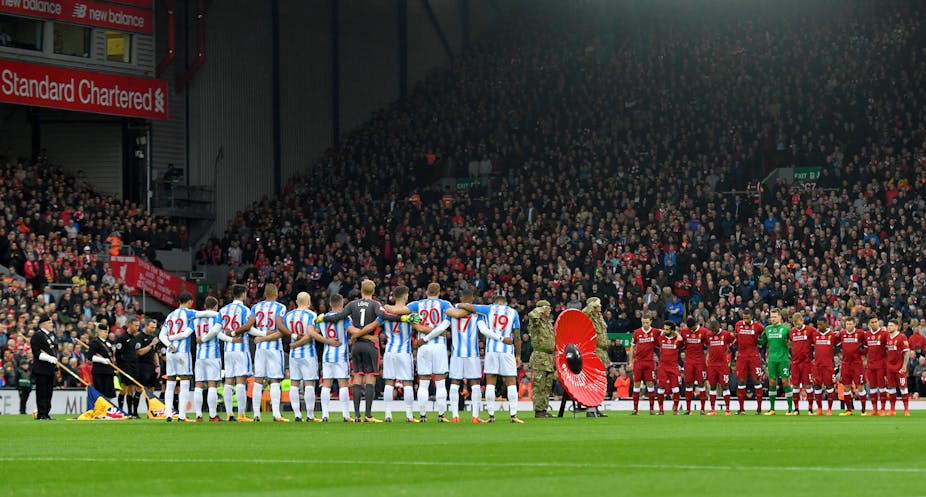At the London Stadium on Sunday, November 7, the players of West Ham United and Liverpool football clubs gathered around the centre circle, arms interlinked. Falling poppies filled the big screen as former England team captain Trevor Brooking read John McCrae’s poem, In Flanders Field, and a trumpeter played The Last Post. Such remembrance ceremonies have become a familiar feature of the football calendar in November.
Since June 2020, a more recently adopted ritual has been observed in UK football. In the wake of George Floyd’s murder in May 2020, English Premier League players started taking the knee in a gesture of protest against racial discrimination inside football and the wider community. The English Football League and the Scottish Premier League followed suit.
Football has become enveloped in the burgeoning post-Brexit culture wars. This is often framed as an intergenerational conflict between young and old or as a political clash between conservatives and the so-called woke left.
At first glance, there seems to be little that unites these two symbolic acts. But, on closer inspection, there are commonalities. Identifying these can help us avoid, as I have shown, the intellectual dead end that is the “keep politics out of sport” mantra.

Invented traditions
During Euro 2020, Home Secretary Priti Patel defended some fans right to boo players who knelt. For her, the latter were engaging in “gesture politics”. This term is most often used disparagingly to describe crude symbolism resulting in little practical action. But Italian philosopher Giorgio Agamben argues that such gestures harness potent political power.
Whereas wearing the poppy is often portrayed as traditional and apolitical, taking the knee is perceived as new and ideological. In reality, both are what British historian Eric Hobsbawm has called invented traditions. They draw on longer legacies to imply continuity with the past, seeking to inculcate values and norms of behaviour through repetition.
Although the Poppy Appeal was first launched by the Royal British Legion 100 years ago, the poppy entered the football calendar far more recently. Minute silences were introduced to matches in around 2000 and footballers only started wearing a poppy in 2009, following a Daily Mail campaign.
Conversely, although the immediate inspiration for taking the knee came from quarterback Colin Kaepernick’s protest in 2016, the gesture has a much longer lineage. The English Football Association pointed out that it can be traced back to the 18th-century abolitionist movement.

Collective memory
Wearing a poppy and taking a knee are examples of what French philosopher and sociologist Maurice Halbwachs calls collective memory. They seek to reconstruct the past through the prism of the beliefs and needs of the present. In commemorating fallen soldiers and victims of racial injustice, both represent public performances of collectivised grief. These in turn generate what sociologists term symbolic capital: which can help to facilitate political reform, as well as consolidate or reinvent national identities.
If the culture wars can be understood as a debate about what values the UK stands for, as a nation, the controversies surrounding the poppy and taking the knee (in UK football) can be seen as attempts to shape the narrative on British national identity. Both address a perceived sense of crisis in postcolonial Britishness from alternative perspectives.
In the context of a fracturing British state, military remembrance remains, as the political scientist Michael Moran put it in The End of British Politics, “the one civic ideology” that is truly bipartisan and common to all parts of the United Kingdom. Although taking a knee has been explicitly defined by the players according to a relatively narrow anti-racist message, it is symbolically connected (not least by its rightwing detractors) to the wider Black Lives Matter movement, as well as the campaign for greater critical awareness of Britain’s colonial past and contemporary inequities.

These collective visions are punctured by the alternative experiences of individuals. James McClean and Nemaja Matic have refused to wear the poppy because of its connotations with British military interventions in Northern Ireland and Serbia, respectively. Wilfred Zaha and Marcus Alonso have similarly vowed to stop taking the knee, describing it as “degrading” and “losing strength” as a gesture of anti-racism.
Common to both military remembrance and taking the knee in football is a denial of their underlying politics. More than mere gestures, they convey a great deal about how the British think about their collective national identity in the 21st century.
Acknowledging this is the first step to better mutual understanding. Closing down debate and maintaining the naive belief that politics can be kept out of the national sport only enables expedient politicians and commentators to exploit football for cheap populist points.

